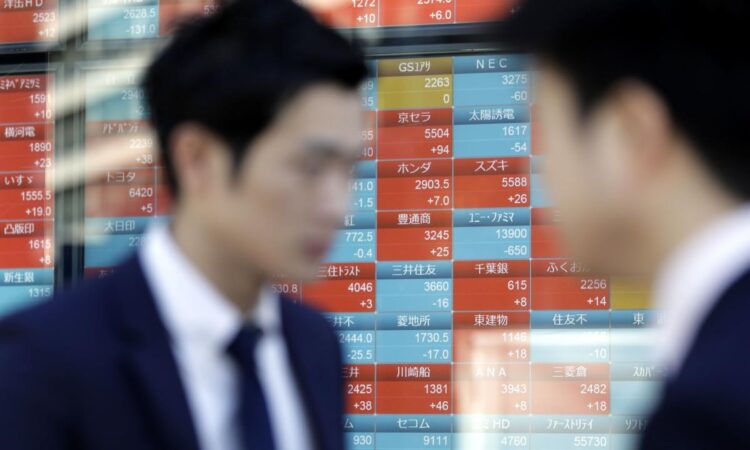
(Bloomberg) — Chinese stocks led declines in Asia, with the yuan falling to a four-month low as traders grappled with weak corporate guidance and signs that Beijing is relaxing its grip on the currency.
Most Read from Bloomberg
China’s CSI 300 Index fell as much as 1.6%, on pace for its largest daily drop since January, and the Hang Seng Tech Index slid around 4%. Australian and Korean shares also declined. Japanese stocks rose. A gauge of the region’s shares had touched the highest level in almost two years in the prior session.
The dollar rose against almost all its Group-of-10 peers and surged against some emerging-Asian currencies, as an unexpected rate reduction by the Swiss National Bank on Thursday spurred speculation that other major central banks will reduce their policy rates faster than the Federal Reserve. The Australian dollar weakened the most among G-10 currencies.
The onshore yuan’s drop breached a closely watched technical level after a months-long effort by Chinese authorities to keep the managed currency in a narrow range. The People’s Bank of China lowered the daily reference rate by the most since early February, a sign to some that Beijing is greenlighting more depreciation amid a bumpy economic recovery.
“The market is having a bit of a re-think on the dollar post the FOMC,” said David Forrester, senior FX strategist at Credit Agricole CIB. “The weaker onshore yuan is having ripple effects onto the rest of dollar-Asia as well as G-10 currencies, especially the Aussie, which often acts as a proxy for the yuan in the G-10 space.”
Contracts for US stocks were little changed in Asian trading after the S&P 500 index advanced 0.3% to a fresh high Thursday — its 20th of the year — led by gains in industrials and banks.
US economic data supported the argument the Fed may be forced to backtrack on its rate-reduction forecasts a day after the central bank indicated three 25-basis-point cuts in 2024. Housing, manufacturing and labor-market data released Thursday in the US pointed to a resilient economy that could prompt the Fed to reduce interest rates slower than the market expects.
Societe Generale SA increased its S&P 500 year-end forecast to 5,500 from 4,750 — the highest among strategists tracked by Bloomberg. “US exceptionalism is going from strength to strength,” wrote Manish Kabra, head of US equity strategy for the French bank. “Despite widespread market optimism, we view this as rational rather than excessive.”
The yen was little changed, trading around 152 per dollar as Japan’s inflation accelerated to the quickest pace in four months. Markets will stay focused on whether the Bank of Japan might follow its first interest rate hike since 2007 with further increases later this year.
China’s Pause
While some said a proposed bill in the US targeting investment by mutual funds in some products that track Chinese equities may have hurt sentiment, others argue that it was about time for the stock rally in China to stall.
“It just seems to be some profit-taking and the weak yuan doesn’t help either,” said Ken Wong, an Asian equity portfolio specialist at Eastspring Investments Hong Kong Ltd. “The US dollar is surprisingly still quite strong.”
The Reserve Bank of Australia released a financial stability review on Friday, saying that banks are strong and households resilient to higher rates.
Ahead in Asia, Taiwan will publish February jobs data.
In commodities, oil held a two-day drop, with traders assessing the outlook for global interest rates and geopolitical tensions in the Middle East. Elsewhere, Bitcoin traded around $66,000, while gold fell after surging above $2,200 an ounce for the first time.
Key events this week:
-
Germany IFO business climate, Friday
-
Atlanta Fed President Raphael Bostic speaks, Friday
-
ECB’s Robert Holzmann and Philip Lane speak, Friday
Some of the main moves in markets:
Stocks
-
S&P 500 futures were little changed as of 2:07 p.m. Tokyo time
-
Nikkei 225 futures (OSE) rose 0.3%
-
Japan’s Topix rose 0.5%
-
Australia’s S&P/ASX 200 fell 0.2%
-
Hong Kong’s Hang Seng fell 2.7%
-
The Shanghai Composite fell 1.2%
Currencies
-
The Bloomberg Dollar Spot Index rose 0.2%
-
The euro fell 0.2% to $1.0836
-
The Japanese yen was little changed at 151.57 per dollar
-
The offshore yuan fell 0.6% to 7.2616 per dollar
Cryptocurrencies
-
Bitcoin rose 0.9% to $66,058.51
-
Ether rose 0.7% to $3,508.59
Bonds
-
The yield on 10-year Treasuries declined two basis points to 4.25%
-
Japan’s 10-year yield was unchanged at 0.740%
-
Australia’s 10-year yield declined five basis points to 4.04%
Commodities
-
West Texas Intermediate crude fell 0.7% to $80.49 a barrel
-
Spot gold fell 0.4% to $2,173.16 an ounce
This story was produced with the assistance of Bloomberg Automation.
–With assistance from Richard Henderson.
Most Read from Bloomberg Businessweek
©2024 Bloomberg L.P.
